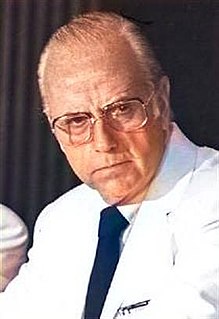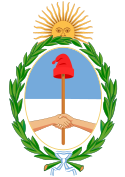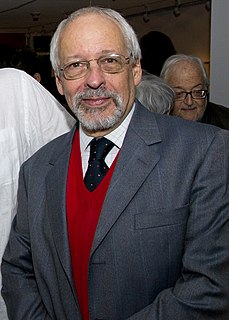
Fernando de la Rúa is an Argentine retired politician of the Radical Civic Union (UCR) who served as President of Argentina from December 10, 1999, to December 21, 2001. De la Rúa was born in Córdoba; he entered politics after graduating with a degree in law. He was elected senator in 1973 and unsuccessfully ran for the office of Vice President as Ricardo Balbín's running mate the same year. In 1993, he was re-elected senator in 1983 and 1993, and as deputy in 1991. He unsuccessfully opposed the pact of Olivos between President Carlos Menem and party leader Raúl Alfonsín, which enabled the 1994 amendment of the Argentine Constitution and the re-election of Menem in 1995.

Raúl Ricardo Alfonsín Foulkes was an Argentine lawyer and statesman who served as the President of Argentina from 10 December 1983 to 8 July 1989. Alfonsín was the first democratically elected president after more than seven years of military dictatorship and is considered the "father of modern democracy in Argentina". Born in Chascomús, Buenos Aires Province, he began his studies of law at the National University of La Plata and was a graduate of the University of Buenos Aires. He was affiliated with the Radical Civic Union (UCR), joining the faction of Ricardo Balbín after the party split.

Argentina held presidential and parliamentary elections on Sunday, April 27, 2003. Turnout was 78.2%. No one presidential candidate gained enough votes to win outright, but the scheduled runoff was canceled when first-round winner Carlos Menem pulled out, handing the presidency to runner-up Néstor Kirchner.
The Olivos Pact refers to a series of documents signed on November 17, 1993, between the governing President of Argentina, Carlos Menem, and former President and leader of the opposition UCR, Raúl Alfonsín, that formed the basis of the constitutional reform of 1994. These memorandum of understanding were signed in the official presidential residence, the Quinta de Olivos.

The Argentine general election of 1995 was held on 14 May. Voters chose both the President and their legislators and with a turnout of 82.1%.

Argentina held presidential and parliamentary elections on 24 October 1999.

The Argentine general election of 1983 was held on 30 October and marked the return of constitutional rule following the self-styled National Reorganization Process dictatorship installed in 1976. Voters fully chose the president, governors, mayors, and their respective national, province and town legislators; with a turnout of 85.6%.

The Argentine general election of 1989 was held on 14 May 1989. Voters chose both the President and their legislators and with a turnout of 85.3%, Carlos Menem won the presidency, and the Justicialist Party won the control of both houses of Congress. This is the last presidential election the president was elected by the electoral college.
Argentina held national parliamentary elections on 26 October 1997. This election was the second time of the peronist Justicialist Party defeated since 1985, while Justicialist Party maintained control of the Congress.
The Argentine legislative elections of 1991 were held between August and December, though most polls took place on 8 September. Voters chose their legislators and governors and, with a turnout of 79.9%, it produced the following results:

The Integration and Development Movement is a political party in Argentina.

Horacio Massaccesi is an Argentine politician and former Governor of Río Negro Province.

Alejandro Armendáriz was an Argentine physician and politician.

The Argentine general election of 1922 was held on 2 April. There was a turnout of 55.2%.

Margarita Stolbizer is an Argentine lawyer and prominent politician.

César Jaroslavsky was an Argentine politician prominent in the UCR, the country's oldest existing political party.

Víctor Hipólito Martínez was an Argentine lawyer and politician, best known for his role as Vice President during Raúl Alfonsín's 1983–89 tenure.
Raúl Alfonsín was the president of Argentina from 1983 to 1989.
Carlos Menem was president of Argentina from 1989 to 1999.




















